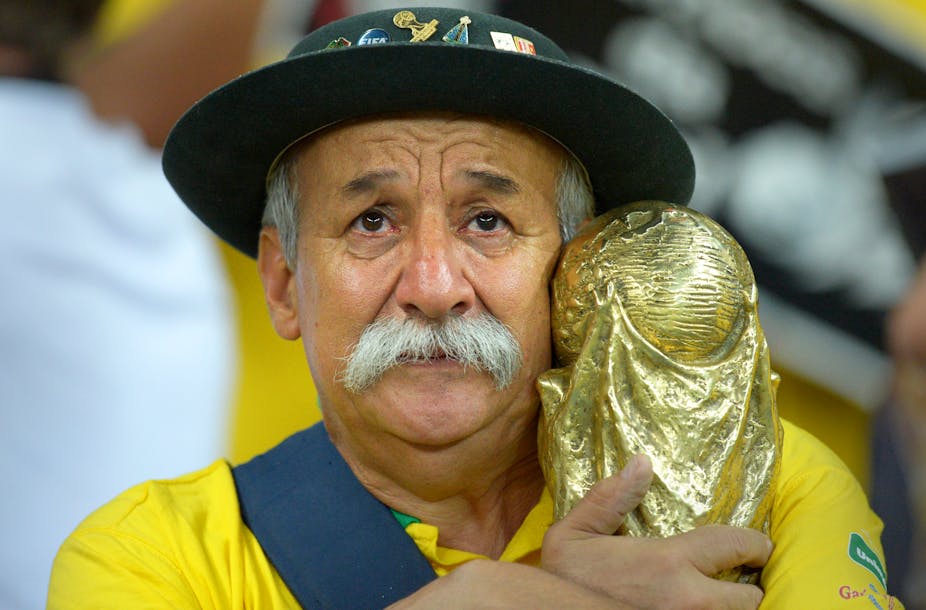The shock, disappointment and shame felt in Brazil after their humiliating semi-final defeat to Germany has been apparent for all to see. In fact, the despair that the defeat caused both team and their home fans has garnered global attention. So how is it that we experience these collective emotions and how can Brazil move forward with any semblance of pride, especially now their rivals Argentina are through to the final?
Mega-sporting events are one of the main venues that nations come together in collective unity. And, one of the (usually) intangible positive legacies of hosting such an event is that the nation becomes really unified on an emotional level. But for Brazilians experiencing the fall out of their team’s defeat, the raw negative emotions were widespread and would have felt very real to the supporting population.
It’s only natural
Research into how groups feel emotions collectively can tell us a great deal about why people come to experience these kinds of emotions and how they can be shared by millions of people simultaneously. The ability to feel emotions with and on behalf of others is an important feature of human existence. It’s a topic that has been studied in terms of individual experiences of “basking in reflected glory” (like when your team wins) and “cutting off reflected failure” (when your team loses). But more recent work reinforces the idea that feelings which seem to be an internal, private thing, are actually very social and relational.
Group-based emotions are feelings or affects that are felt by individuals on behalf of a group that they are a member of and collective emotions are experienced with others in groups and particularly in crowds. Studies of these two types of emotion can be used to understand Brazil’s recent World Cup experience. In Brazil’s loss against Germany, both were at play for the country writ large.
In the semi-final, the risks that come with hosting a World Cup – the extreme enthusiasm and expectation of celebrating success – were ruthlessly exposed. Generally, collective desires that your team, organisation or nation succeeds have the potential to generate euphoria, pride, unity, cohesion and solidarity. The nature of the Brazilian team’s defeat by Germany, however, shows the rare counter to this: collective shame.
The pursuit of national interests through an event like a World Cup has strong potential to generate national pride and provide positive international attention. Even if the host nation exits the tournament in a disappointing fashion (think of the South African team in the 2010 World Cup), there is still much satisfaction to be had from hosting a successful event. But, when expectations of success can only be met by winning the event itself, the risk of negative collective emotions is much greater. This seems to have been the case for Brazil who have long been desperate to overturn the tragedy of the 1950 Maracanazo defeat and had not lost a competitive match on home soil since 1975.
Historic proportions
While a single-minded, shared focus on winning increases the collective pain of defeat, it is the humiliating nature of Brazil’s loss to Germany and historically memorable result that makes Brazil’s collective shame relatively unique in the history of mega-sport events. When things go wrong for the host nation they rarely occur in such an emphatic fashion that supporters feel that the team has done this to themselves and the nation.
In local and international media, national narratives are evoked and reworked to make connections with previous traumas – like Brazil’s 1950 World Cup final loss to Uruguay. But unpredictable mixtures of collective shame, pride and anger may have further effects on a potentially fragile sense of national identity as Brazilians look to the future. National pride is built on multiple factors and sources that include a sense of belonging, identification with a range of in-group cultural practices and values. So, while football is an important part of Brazilian identity, it is not the only thing and so the country’s collective pride is likely to be resilient.
The progression of Argentina to the final, however, raises the real and potentially intolerable prospect of Brazil’s bitter rivals winning the host’s tournament. While a strategic switch to support Germany might avoid further humiliation, it would not begin the process of recovering collective pride. That recovery may only begin with a strong performance in the playoff for third place and recognition of other means by which Brazilians can feel successful and powerful in the shifting matrix of global national identities.

